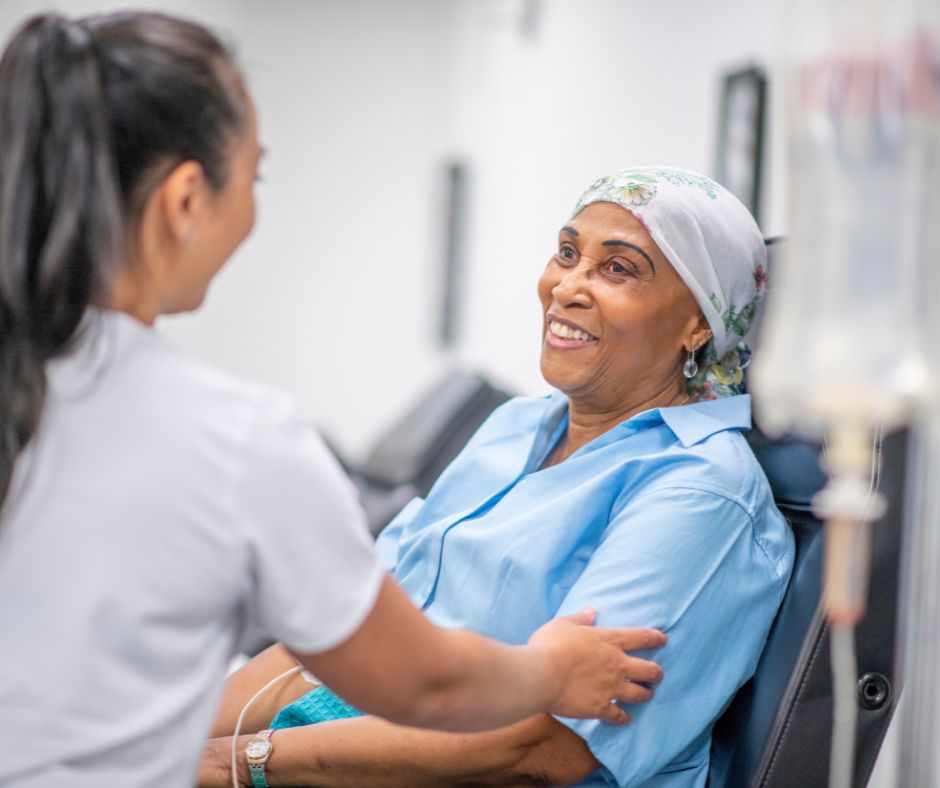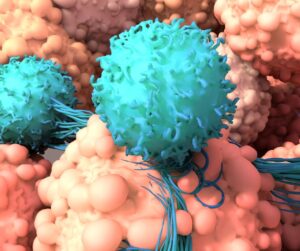Bo Gamble and Ronda Bowman, MHA, RN, OCN
What is good cancer care? The answer to that question continues to vary even as our country places an increased emphasis on the quality and value of health care. For cancer care, and depending on who is being asked, the answers could be a variety of things, such as:
- Facility appearance and friendliness of the physician and staff – newly diagnosed patient
- Communication with 24-hour access to care – patient receiving treatment
- Overall survival – science companies that develop therapies for cancer
- Effective care with timely follow-up with patients – oncology provider and care team
- Compassion and understanding of patient’s wishes with end-of-life care – patient and caregivers
- Efficiency in care delivery – insurers and other payment entities
- Adherence to evidenced-based medicine – patients, family members, care teams, and all types of payers
The multitude of varying perspectives have always made it challenging to define a comprehensive and consistent quality program that could be applied to any cancer treatment plan and care delivery setting – regardless of who is being impacted. The lack of consistency in understanding quality then also makes it almost impossible to implement new payment methodology that attempts to address quality.
The American Society of Clinical Oncology (ASCO) and the Community Oncology Alliance (COA) are piloting quality standards applied to cancer care delivery that emphasize proven quality measures for the entire patient journey. These standards and care delivery model are known as the Oncology Medical Home (OMH), which have been in development for the last 7 years. These programs build on early efforts from others that first began with an idea that then matured into a national grant, the recent Oncology Care Model, varied accreditation programs, and a wide range of attempts by insurance companies to define quality cancer care. ASCO and COA have applied the lessons learned from these earlier attempts to shape a care delivery model following a systematic review of evidence and consensus from an expert panel of clinicians, health system administrators, and patient advocates.
The 7 domains of quality in the OMH program are:
- Patient engagement – Specific and timely communication with patients through their cancer care journey with an emphasis on patient and caregiver education. Patient and care team expectations are emphasized early to nurture trust and accountability. These communications cover how to access their care team – regardless of time of day or level of care needs. There is a priority for team-based survivorship care program, as well as support services for financial concerns and access to resources.
- Availability and access to care – Practice institutes expanded access to care using an evidence-based symptom triage system supporting same day sick visits, standardization, and consistency in care. There is a requirement to track any type of hospital visits and assure patient follow-up.
- Evidenced-based medicine – Evidenced-based medicine, also known as oncology clinical pathways, is a specific set of pathways assessed and balanced on efficacy, toxicity, and cost in determining pathway recommendations. Cancer care teams are required to monitor pathway utilization and off-pathway treatment plan use. Patients are provided clinical research trial information as appropriate for the patient’s clinical condition.
- Equitable and comprehensive team-based care – Quality care is within the provider led team and extends beyond the walls of the cancer care center. Each patient has a provider-led care team, that provides coordination with other pertinent physicians and services. This coordination within the team extends to other outside resources while also identifying and addressing psychosocial distress and disparities that are preventing access to cancer care.
- Quality improvement – The achievement of quality is not a single milestone. The pursuit of compliance with the domains, and associated standards within each domain, develops a mindset of continuous quality improvement. Achieving a goal will cause a higher goal to be established. This domain requires quality improvement be demonstrated by responding to patient experience feedback and the completion of enterprise-wide quality improvement projects.
- Goals of care, palliative and end of life – Practice offers an advance care planning discussion and completes a goals of care discussion with all patients that recognizes the individual patient’s needs and preferences. To a patient, these discussions can be the most important steps in their journey – understanding the importance of communicating their wishes. This domain supports patient education with staff knowledge in advanced directives, medical durable power of attorney, and medical orders for life-sustaining treatment. The practice will introduce palliative care early for all patients with cancer; complete a goals of care discussion with all patients with advanced cancer; and provide patient-centered access to care for patients at the end of life to avoid unnecessary and unwanted ED visits and potential hospitalizations. Addressing symptom management throughout the patient’s journey is essential. Quality end of life care requires a sensitive and compassionate spirit by the care team.
- Chemotherapy safety – This domain includes the quality and safety standards for preparation and administration of chemotherapy. These standards are identical to the Quality Oncology Practice Initiative (QOPI®) Certification Program standards. The inclusion of chemotherapy safety standards within the Oncology Medical Home standards further emphasizes the goal of demonstrated comprehensive quality care.
Cancer care teams that first review the OMH’s 7domains and standards may conclude that they are satisfying the requirements and are therefore eligible to be recognized for these efforts. However, each of the domains and standards require quantified compliance and ongoing measurement of adherence. These stringent standards require a team commitment to higher quality care that is proven by process and outcomes measure.
The value of the OMH Standards is a single set of standards that allows gap analysis and provides a roadmap to high-quality cancer care for the entire patient journey. These standards prepare the care teams for recognition of care delivery based on quality and value.
ASCO and COA are partnering in new, 2-year pilot program called the ASCO Patient-Centered Cancer Care Certification. It will certify outpatient oncology group practices and health systems that meet this single set of comprehensive, expert-backed standards for patient-centered care delivery. The pilot is based on the published OMH Standards from ASCO and COA.
Advanced practice providers serve a significant role in ensuring high quality cancer care, particularly in leading care delivery efforts like the OMH and the ASCO Patient-Centered Cancer Care Certification. Their expertise and knowledge, combined with unending commitment to high-quality, patient-centered cancer care will be essential in implementing and sustaining the OMH Standards. Together, as a team, hopefully through these efforts we can help better define and raise awareness of what “good” cancer care is.
To learn more about the OMH Standards:
Tools & Resources – ASCO
Oncology Medical Home Standards | ASCO
Patient-Centered Cancer Care Certification | ASCO Practice Central
Tools & Resources – COA
Home – Oncology Medical Home (https://medicalhomeoncology.org/)

Bo Gamble: Director of Quality and Value – Community Oncology Alliance (COA)

Ronda Bowman, MHA, RN, OCN: Director, Patient Centered Cancer Care – ASCO Care Delivery







